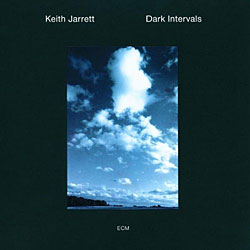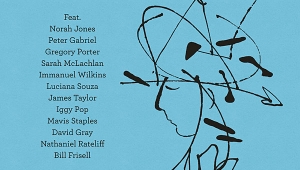| Columns Retired Columns & Blogs |
Recording of March 1989: Dark Intervals
 KEITH JARRETT: Dark Intervals
KEITH JARRETT: Dark IntervalsKeith Jarrett, piano
ECM 1379 (837 342-1, LP; -2, CD). Kimio Oikawa, eng.; Manfred Eicher, prod. DDA/DDD. TT: 58:22
After a five-year hiatus in which he explored jazz standards, classical music, the clavichord, and the unclassifiable Spirits, Keith Jarrett has returned, however briefly, to the form that gained him his widest reputation: solo piano improvisations. But with a difference—only a single LP this time (instead of two, three, or ten), that LP composed of eight short sections, each with a title. This is a far cry from unbroken piano improvs spanning three LP sides, titled only with the name and date of the venue.
In this live concert recorded in Japan in April 1987, Jarrett's staggering technique remains intact, only more finely tuned. The set opens, appropriately enough, with "Opening," in which chaos emerges out of order, the last half of the 13-minute piece a rumbling exploration of the piano's bass strings. "Hymn" follows, more redolent of cantorial lamentation than the Gurdjieffian chords of Jarrett's 1980 Sacred Hymns; "Prayer" might have been a better title, so plain is the playing's supplication. "Americana" opens with gospel leached through Copland—pastoral America only is evoked, of course, not Chicago or even Allentown, PA (Jarrett's home town). "Parallels" are just that, right and left hands shadowing each other with meticulous imprecision, as if cast over rough ground, in an obstinate, linear rhythm divorced from breath's ease. "Fire Dance" builds to a churning, frenzied climax, the ghost of Villa-Lobos hovering near. "Ritual Prayer" is based in the Near East—I imagine squat Greek Orthodox basses rumbling out the lower harmonies. And "Recitative" could be called "Paradise Regained," so inevitably does it build to its central, benign apotheosis, then fall back to great but quiet peace.
This album of often profound beauty, had it been released by anyone else, would call for much more acclaim; as it is, it's just another Jarrett solo masterpiece in the tradition of Staircase and The Moth and the Flame. The CD's DDD sound is some of the most natural solo piano sound I've heard (assuming you listen with your ears nearly touching the soundboard), entirely without harshness or glare. But, good as the CD is, the LP is better in the usual ways—deeper, rounder, more full, with greater three-dimensionality.—Richard Lehnert
- Log in or register to post comments




































